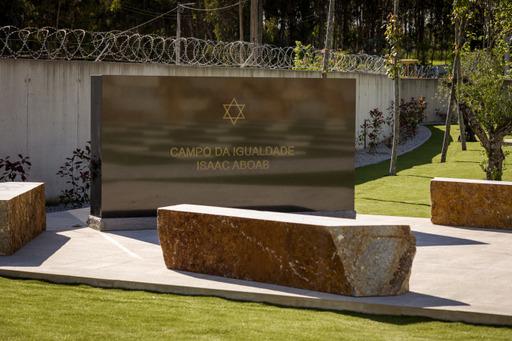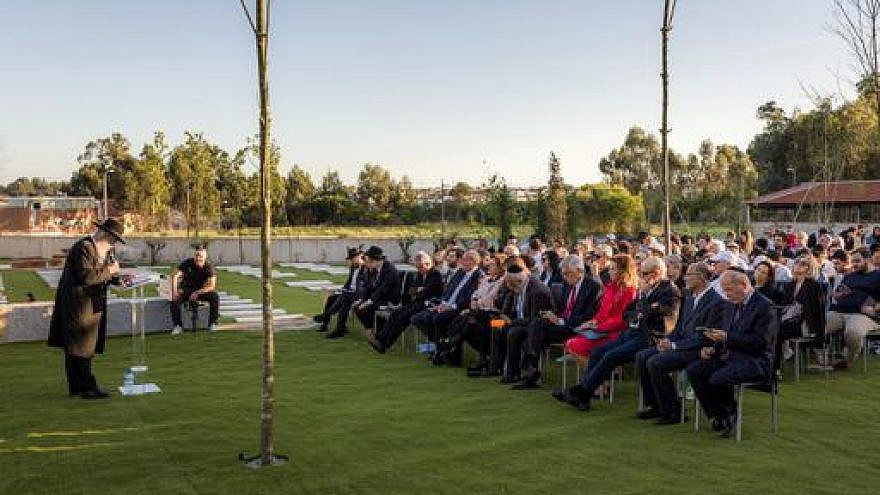The Jewish Community of Oporto, Portugal, inaugurated its new cemetery on April 25. The ceremony took place on Israel’s Memorial Day and included a tribute to the Jewish state’s fallen soldiers.
The event was presided over by the Ashkenazi Chief Rabbi of Ashdod Yosef Sheinin, who was joined by other rabbis from Portugal, Israel, the United States and the United Kingdom.\The community named the cemetery the Isaac Aboab Field of Equality, after the last gaon of Castile, who lived and died in Oporto following the Expulsion of the Jews from Spain.
“Unfortunately, we do not even know where the last gaon is buried, because the persecution destroyed all traces of the Jewish community of the time,” said Daniel Litvak, Oporto’s chief rabbi.
The previous cemetery was destroyed in 1497 in the wake of an edict of King Manuel I of Portugal (1495-1521), who persecuted Portugal’s Jews. “We do not forget in the past we were robbed of all our assets, houses, even the cemetery was destroyed,” said Rabbi Asaf Portal of Oporto.
The new cemetery has about 300 individual gravesites, family vaults and a purification house. Rabbi Eli Rosenfeld, president of Chabad Portugal, said, “The new cemetery of the Jewish Community of Oporto is proof that the Jews always regenerate. Having a Jewish burial is something of utmost importance in Jewish tradition. The dedication of the new Jewish cemetery is therefore truly a momentous occasion.”

The cemetery is set in a pastoral area with trees, grass and a lake. “It would be impossible in Oporto to build a private cemetery in a quiet, discreet location. The community decided to buy land outside the city in Maia, a quiet location eight kilometers from Oporto,” said Oporto Rabbi Yoel Zekri.
Maia Mayor António Silva Tiago, who attended the ceremony, said, “Jews are and will always be very well received in Maia, which is a city close to Oporto with a long Jewish tradition and which is currently increasingly cosmopolitan and thriving.”
Abdul Manga, the president of the Muslim Community of Oporto, said, “The friendly relationship between our three communities—Jews, Muslims and Catholics—is an example for the world.”
The Auxiliary Bishop of Oporto D. Vitorino, who represented Bishop D. Manuel Linda, also addressed those present.
The Oporto Jewish community, now one of the strongest in Europe, has seen a resurgence over the last decade. Its membership numbers a thousand. It boasts three synagogues, including the largest in the Iberian Peninsula and the second-largest in Europe, a Holocaust Museum (the most visited museum in Portugal in 2021), a Jewish Museum, restaurants, shops, a kosher hotel, an online school, two newspapers, a male choir and a painting gallery.
The community has produced several feature films including “Sefarad,” which details the history of the Jews of Oporto, and “1618,” the story of the last inquisitorial persecution in the city. It is considering producing a film on the Lisbon pogrom of 1506.
Gabriel Senderowicz, president of the Oporto Jewish community, spoke of the history of two millennia of Jewish existence in the city, and the recent trials the community has faced.
The Oporto Jewish community says it has been the target of an antisemitic campaign since early 2020 orchestrated by those seeking to abolish the Nationality Law for Portuguese Sephardic Jews, the “Sephardic Law.” The 2015 legislation grants Portuguese citizenship to descendants of Jews expelled from the country in the 15th century.
The community was accused of running a racket by rubber-stamping citizenship certificates, Senderowicz told JNS. “It was presented to the world as the sale of passports by a rabbinate who acted for money.”
Among the indignities that the Oporto community endured was the public arrest of Litvak, its chief rabbi. Litvak was placed in a cell with a murderer and denied kosher food, forcing him to go more than 24 hours without eating, according to a complaint the community filed with the European Public Prosecutor’s Office (EPPO), an independent body of the European Union, in August 2022.
Litvak was vindicated when the Lisbon Court of Appeal rebuked Portugal‘s Public Prosecutor’s Office in September 2022, revoking restrictive measures placed on the rabbi and referring to the charges as “without factual basis.”
However, the campaign against the community bore bitter fruit as the government passed revisions to the Sephardic Law that members of Portugal’s Jewish community say create demands that are impossible to meet.
“No Sephardi in the world has made hundreds of trips to Portugal since childhood, let alone owns properties inherited from ancestors who lived in the country at the time of the Inquisition,” Senderowicz told JNS.
The community has fought back against the calumnies. Most recently, in March, it sent an open letter to Portuguese President Marcelo Rebelo de Sousa, calling on him to issue a public apology for the “antisemitic witchhunt” it has endured.
“We know the Portuguese president is very sympathetic to the Jewish community and is a well-respected public figure, so such a pronouncement from his office will hopefully end this sordid episode,” Senderowicz said.

























